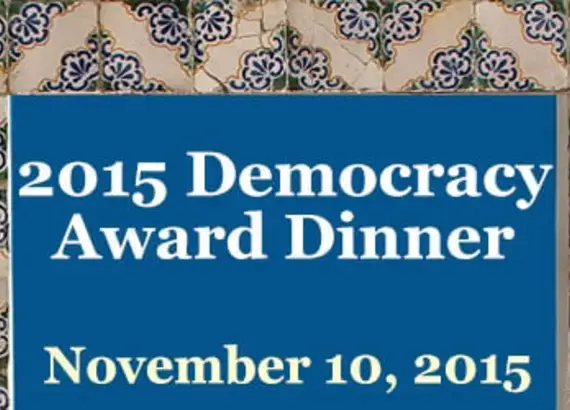
Success Story
At November 10 Dinner, NDI to Honor UN High Commissioner for Refugees and Four Tunisians Who Are Advancing the Promise of Democracy
NDI announced today that it will honor four Tunisian political and civic leaders, and the United Nations High Commissioner for Refugees at its annual Democracy Award Dinner on Tuesday, November 10.
The dinner will be held at the Ritz-Carlton Washington, D.C., 1150 22nd St., NW. It will begin at 7:00 p.m. and will be preceded by a reception at 6:00 p.m. Tickets may be obtained through this link.
Tunisians Yassine Brahim, Rafik Halouani, Wafa Makhlouf and Sayida Ounissi will be honored along with United Nations High Commissioner for Refugees António Guterres. The W. Averell Harriman Democracy Award, NDI’s highest honor, is presented annually to individuals or organizations that have demonstrated a commitment to democracy and human rights.
The Tunisian honorees have been at the forefront of efforts to advance the democratic transition in their country, reflecting a new generation of democratic leaders. Brahim is the Minister for Development, Investment and International Cooperation, and president of the Afek Tounes Party. Ounissi and Makhlouf are elected members of the Assembly of Representatives of the People, Tunisia’s parliament. Halouani is the president of Mourakiboun Network, a leading election observation network in Tunisia. It is leaders from civil society, political parties and government, like those honored in this year’s Democracy Award ceremony, who are turning the promise of the Tunisian revolution into real improvement in the daily lives of citizens and make democracy succeed.
“Tunisia shows that democratic change is not an elusive goal in the Middle East and North Africa; it takes persistence, inclusivity and compromise,” said former Secretary of State Madeleine Albright, NDI’s chairman. “The biggest challenge today is to meet the expectations for tangible improvements in the daily lives of the Tunisian people. Those who are advancing the promise of democracy in Tunisia deserve strong and sustained international support.”
Guterres played a central role in the democratic transition in his own country of Portugal, and served as the Portuguese prime minister from 1995 to 2002. As president of the international grouping of Social Democratic and Labor parties, he expanded the organization’s support for democracy abroad and Guterres volunteered with NDI the Middle East, sharing his experiences in places like Iraq and Jordan. Guterres was elected by the UN General Assembly in 2005 as the High Commissioner for Refugees. The United Nations High Commission on Refugees is one of the world’s preeminent humanitarian organizations and has twice won the Nobel Peace Prize. Guterres is now at the front lines of recent efforts to aid Syrians who are leaving their country to find refuge in Europe.
In his call for European democracies and the United States to welcome those escaping Syria, Guterres has said that “[We need] the capacity to show that we can see diversity is a richness, not a problem, that we understand our societies are being inevitably multiethnic, multiracial, multicultural, multi-religious and that is good for societies.”
“As someone who fled both communist and Nazi occupation of my country of birth, I understand that the refugees from Syria are fleeing to Europe not just to escape persecution, but also to find stability, dignity and freedom -- three things that only democracies can provide. The refugee crisis is a result of the failure of dictatorship,” Albright said.
Tunisia has been at the forefront of political reform in the Arab world since December 2010 when discontent with autocratic rule and government corruption erupted in mass street demonstrations, resulting in President Zine al Abidine Ben Ali’s departure from power in January 2011. The Tunisian revolution, which was catalyzed by the self-immolation of Tunisian street vendor Mohamed Bouazizi, also inspired uprisings across the region that became known as the Arab Spring. The drivers behind the revolution and the hope for the elections lay in the desire of Tunisians for economic empowerment, dignity and a government that serves the people. In the nearly five years following the revolution, Tunisia has experienced both euphoric and tragic periods. The writing of the new constitution was a lengthy process, but combined the views of a range of ideologies and political backgrounds into the most progressive constitution in the region. International observers hailed the 2014 elections, which marked first democratic legislative and presidential polls in Tunisia, as a significant achievement.
Long involved with supporting Tunisian democracy activists, NDI opened an office in the country following the uprising of 2010. With support from the United States Agency for International Development, the U.S. Department of State’s Bureau of Near Eastern Affairs, the National Endowment for Democracy, and the Canadian Department of Foreign Affairs, Trade and Development, NDI is providing assistance to newly established governing institutions and emerging civil society organizations.



